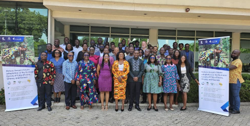
The International Union for Conservation of Nature (IUCN) in collaboration with the World University Service of Canada (WUSC) has organised a two-day high-level capacity building and policy engagement session on mainstreaming Nature based Solutions (NbS) into national development sector policies.
The engagement, which happened on the 27th and 28th of March in Accra, was organised under the auspices of the “Nature-based Climate Adaptation in the Guinean Forests of West Africa Project” (NbS Project) funded by Global Affairs Canada.
The event was attended by a broad range of stakeholders including government officials, members of the Diplomatic Corps as well as representatives of the private sector, non-governmental organisations, civil society organisations, research and academia and the media.
Opening statements by the various speakers from IUCN, Ministry of Environment, Science and Technology (MEST), World University Service of Canada (WUSC), the Canadian High Commission and the Forestry Commission (FC), underscored the pivotal role NbS plays in addressing climate change, which highly impacts biodiversity, smallholder farmers, water access, and forests in Ghana.
They agreed that NbS enhances biodiversity and advances sustainable land management. Hence, the need to incorporate NbS into Ghana’s national development context.
The speakers emphasised the critical role of government leadership and multi-sectoral collaboration in advancing NbS initiatives across Ghana and the entire West African region.
On behalf of the Ministry of Environment, Science and Technology, Dr. Peter Dery, TECHNICAL Director in-charge of Environment declared: “Incorporating Nature-based Solutions into Ghana’s development frameworks is not just a priority, but a necessity to combat the escalating environmental challenges we are continually facing.”
The engagement was in two sessions. The first successfully built the technical capacities of 56 industry experts and policymakers on the NbS concept, its development process and overarching principle.
A key component of this sub-session was the practical guidance on the utilization of the Self-Assessment Tool (SAT), which enables users to assess whether case study initiatives were NbS or not.
The tool additionally empowers stakeholders to evaluate and determine if projects qualify as true nature-based solutions, ensuring the effectiveness and sustainability of NbS interventions.
The sub-session further offered a platform for stakeholders to exchange knowledge and leadership development skills in addition to sharing their experiences with NbS , and advocated for its adoption.
The second sub-session was the policy engagement that provided an opportunity for stakeholders to fine-tune and collaboratively validate a draft policy brief on mainstreaming Nature-based Solutions (NbS) across various development sectors in Ghana.
The discussions highlighted several entry points for integrating NbS into existing sector policies. These included aligning policies in Ghana such as the Riparian Buffer Zone Policy to incorporate the NbS approach and ensuring the participation of women and vulnerable groups in the management of freshwater bodies.
In the fisheries sector, it was recognized that while various sector policies exist, they often lack inter-sectoral coordination, which is a critical gap that NbS could help address.
Another important concern was revisiting the National Water Policy to incorporate NbS as a more sustainable solution for managing flood risks and coastal degradation, instead of relying on temporary sea defense walls.
There was also strong support for promoting green infrastructure and green spaces, which could serve as sustainable alternatives to traditional infrastructure, contributing to the long-term health of ecosystems.
Overall, the engagement has further pushed Ghana towards a more resilient future as participants affirmed their support for the mainstreaming of the NbS and its implementation, recognizing its potential to address societal challenges and climate change impacts.
At closing session, the NbS Project Director at WUSC, Ms. Patience Akwen Nambo, commended the project partners in Ghana namely IUCN, A Rocha Ghana, and ABANTU for Development, for their invaluable contributions and tireless efforts in driving the successful implementation of the NbS initiative.
She expressed her gratitude to the participants for their thoughtful reflections and insightful recommendations, emphasizing the importance of continuous enrichment of the proposed ideas.
Ms. Nambo observed that the collaborative spirit displayed throughout the event highlighted the crucial role of collective action in mainstreaming NbS, particularly in advancing the inclusion of women, whose contributions are essential for sustainable development. “This,” she noted, “is a clear testament to the commitment and determination to build a more resilient planet.”
Ms. Nambo acknowledged the significant challenges that remain, noting that these obstacles should be viewed as opportunities and not setbacks.
IUCN’s NbS Global Head based in Switzerland, Dr. Charles Karangwa and IUCN’s National Coordinator for Ghana, Mrs. Dorcas Owusuaa Agyei co-facilitated the engagement.
Mrs. Agyei viewed the engagement as a reaffirmation of IUCN’s commitment to influence, encourage and assist societies throughout the world to conserve the integrity and diversity of nature.
Also, the successful implementation of the high-level capacity building and policy engagement has sparked further internal discussions on critical next steps. The first is the potential establishment of a national NbS guideline and action plan for Ghana, which would provide a clear framework for integrating NbS into national policies and practices.
The second is the building of a momentum towards creating an NbS-specific fund basket, designed to attract donor funding and support the sustainable scaling of NbS projects across the country.
The facilitators of the engagement see these developments as signifying a positive outlook for the future of NbS in Ghana, ensuring that the ideas proposed during the workshop continue to gain traction and drive meaningful action towards a greener, more resilient future.









